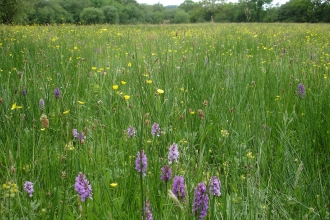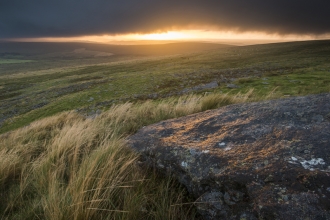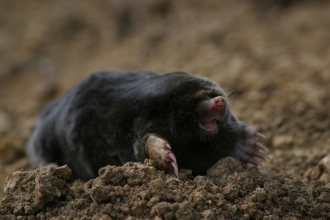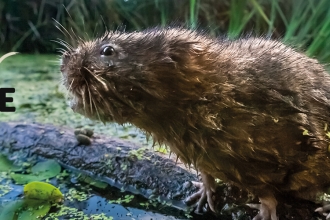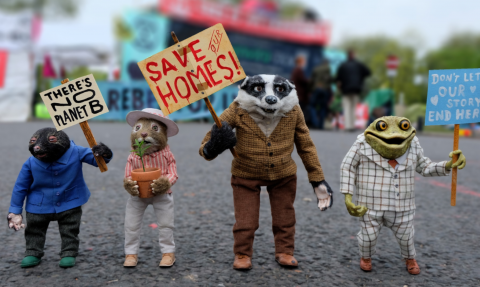
Join our campaign for a #WilderFuture
It's not too late to bring our wildlife back
Join the Wilder Future campaign and help write a better future for wildlife.
Sadly, since the story of Badger, Ratty, and friends was written in 1908, the UK has become one of the most nature-depleted nations in the world. The newly released State of Nature 2019 report shows that one in seven UK species are at risk of extinction today.
We’ve imagined what The Wind in the Willows would look like in 2019 in our animated The Wind in the Willows trailer, and it’s not a happy story. But the story doesn't have the end here.
We are calling for a Nature Recovery Network, where wildlife and wild places are not only protected, they're also restored and connected. Tell your politicians that we need a Nature Recovery Network.
It's not too late to bring our wildlife back, but we must act now. Join the campaign and receive simple actions you can take for nature's recovery.
Our asks to the Prime Minister and his government
We have a new government and at the heart of its priorities has to be the environment. We need a robust Environment Bill which won't just protect nature, but restore it. Here's our CEO, Harry, with our asks to the Prime Minister and his government.
Sir David Attenborough explains a Nature Recovery Network
Kenneth Grahame wrote 'Wind in the Willows' just over a hundred years ago. Since then, many of the UK's wild places, and the plants and animals that depend on them, have been lost. For example, 97% of lowland meadows and the beautiful wildflowers, insects, mammals, and birds that they supported have disappeared; 80% of our beautiful purple heathlands have vanished.
Kenneth Grahame's Ratty - the water vole - is the UK's most rapidly declining mammal and has been lost from 94% of places where they were once prevalent, and their range is continuing to contract. Toad is also finding that times are very tough: he has lost nearly 70% of his own kind in the last 30 years alone - and much more than that in the last century.
Together we can make the next chapter for wildlife a happier one.
Chris Root
Don't let Badger, Ratty, Toad, and Moley go hungry!
41% of insect species face extinction.
Insects are dying out up to 8 times faster than larger animals says a new report showing the devasting and serious decline in insect populations happening right now across Britain.
This is a grave cause for concern - it impacts us all as well as all wildlife. Insects pollinate three quarters of our food crops, and they are the main food source for many birds as well as small mammals and fish.
Take action, and make your pledge today!
Find out more
A bit more about the Wilder Future campaign
Wildlife is in trouble and we are living in one of the most nature depleted countries in the world. Our wildlife needs more nature rich spaces that are bigger and better connected. We are asking politicians for a strong Environment Act and to put in place a Nature Recovery Network – local maps that create and join up wildlife rich places – which would be at the heart of plans for housing, roads and how land is used. We are asking people to join our Wilder Future campaign and take personal action to show that we all care about what happens to local wildlife and wild places. Together we need to make every space in Devon count for nature and be a voice for nature’s recovery that our politicians can’t ignore.
You don’t have to be a wildlife expert to be part of a wilder future for Devon. There are lots of ways you can get involved and, on our website, you will find tools and suggestions to make it easier for you. The main thing is to do something and to share what you’ve done using #WilderFuture with as many people as possible.
The Wildlife Trusts want to create a tipping point of 1 in 4 people taking action.
We have therefore commissioned a film - 'The Wind & the Willows: A Wild Story', which will be screened in cinemas from 29th March 2019, to reach and inspire the public to take action.
Kenneth Grahame wrote Wind in the Willows just over a hundred years ago. Since then, many of the UK’s wild places and the plants and animals that depend on them have been lost. For example: 97% of lowland meadows and the beautiful wildflowers, insects, mammals and birds that they supported have disappeared; 80% of our beautiful purple heathlands have vanished – with their blaeberries, sand lizards and the stunning nocturnal birds, nightjars. Rivers are in deep trouble too: only 20% are considered as healthy and 13% of freshwater and wetland species in Great Britain are threatened with extinction.
Kenneth Grahame’s Ratty – the water vole – is the UK’s most rapidly declining mammal and has been lost from 94% of places where they were once prevalent, and their range is continuing to contract. Toad is also finding that times are very tough: he has lost nearly 70% of his own kind in the last 30 years alone – and much more than that in the last century.
These losses have led to the UK becoming one of the most nature-depleted countries in the world.
Over the past ten years there have been numerous reports and studies documenting wildlife declines in the UK. The main problems for wildlife are:
- Habitat loss – mostly caused by intensive farming, inappropriate development and lack of strategic planning – with the few remaining wild places being broken up by roads.
- Climate change – causing extreme weather events such as storms, droughts and floods which disrupt breeding patterns, threaten life cycles and create food shortages. Wildlife cannot always keep up with changes to the seasons.
Harry Barton, Chief Executive of Devon Wildlife Trust, said:
We are a nation of nature-lovers, yet we live in one of the most wildlife-depleted countries in the world. Even here in beautiful Devon, for example, fewer than one in five of our rivers are in good health. It’s not too late to bring wildlife back, and with better knowledge and clean technology we can have a healthy economy as well as a nature friendly one. But we’ll need strong laws and an ambitious vision if we want our countryside, coast, rivers and towns to be full of the animals and plants that once thrived there. And if this is to happen, we need many more people to speak up for nature. So please join us in our call for a Wilder Future.”
The Wildlife Trusts hope their Wind in the Willows film trailer will inspire people to:
- Meet and/or write to their MPs – to call for strong environmental laws which help nature recover.
- Walk in the pawprints of others – and imagine what wildlife needs to survive in their neighbourhood. Be inspired to take action for wildlife in their garden or local area, working with friends, neighbours – or by getting your local council involved – to create new homes for Toad, Ratty, Badger and friends.
- Create a Wilder Future where you live – by checking out what is on offer at local Wildlife Trusts and ways to make every space count for nature in their local area.
President Emeritus of The Wildlife Trusts, Sir David Attenborough says:
“It is desperately sad that so much of our country’s wildlife has been lost since Kenneth Grahame wrote his wonderful book “The Wind in the Willows”. Of all the characters in the book it is hard to know whose descendants have suffered the most. Water Voles, Toads and Badger’s friends in the book, Hedgehogs, have all seen catastrophic declines.
“Ratty was a Water Vole and these animals can’t burrow into river banks covered with sheets of metal. Toads need ponds and wet areas to lay their eggs. Hedgehogs must roam miles to feed at night but often hit barriers and struggle to find the messy piles of leaves they need for shelter. None of these creatures can cope with road traffic because they did not evolve to recognise a car as dangerous.
“We have damaged our rivers, built too many roads and lost too many ponds and meadows. All of this has happened because our systems and laws that should be keeping nature healthy are failing, and we are losing touch with wildlife. Everything is becoming disconnected.
“The Wildlife Trusts have worked tirelessly to slow wildlife’s decline and to save our remaining wild places. Without The Wildlife Trusts our country would be the poorer. But there is much more to be done. This country of nature lovers needs to give its wildlife every chance to survive, thrive and expand its range.
I am backing The Wildlife Trusts’ campaign to rally people to secure a “wilder future” by restoring large areas of wildlife habitat, in city and country. What we create may not look exactly like the countryside that Kenneth Grahame drew such inspiration from, but our wildlife won’t mind just so long as it has the places it needs to live and thrive.
“As a society we know how to put meanders back into straightened rivers and how to build bridges for wildlife. We know which wild places we should be protecting and expanding. But we need ambitious new laws to ensure we do this, laws that ensure we map out nature’s recovery.
“Meanwhile we can all make a practical difference. If you have a window sill or balcony you can put up bird feeders or plant pots of wildflowers. If you have a garden it is easy to dig a small pond or make holes in your fence for hedgehogs to wander through. It is not too difficult to take up paving slabs to let plants grow to feed our bees.
“Together we can make the next chapter for wildlife a happier one. Join us to put nature into recovery.”
Why is an Environment Act needed in Devon?
We need wildlife
Our natural world is valuable in its own right and is the foundation of our wellbeing - we depend on it and it depends on us. Without a healthy natural world the survival of humanity is at stake. By creating more space for nature, we can create a better world for people and wildlife.
Wildlife is in trouble
From rivers and woodlands, to birds and flowers, our natural world is struggling. Over half the species assessed in the State of Nature report have suffered since the 1970s, with many of our much-loved animals struggling. Just some of the declines we have seen in Devon in recent years include:
- Only 36% of Devon’s most important sites for wildlife (SSSIs) are in favourable condition
- 11 Devon species are in danger of extinction, including breeding curlew, water vole (Ratty) and the nomad bee.
- 2 species have become extinct in Devon in the last 20 years: the orange upperwing moth and Irish Ladies tresses (an orchid)
- Hedges: we have the longest network of any county at 53,000 km, but only 38% is in good condition
- Devon is the north European stronghold for Greater Horseshoe bat. It has declined by 99% in the last century
- WiIlow warblers have declined by 68% since the mid 1980s in Devon
- Nightingales have completely disappeared from Devon, and Kittiwakes are thought to have done so too
Wildlife needs us now
We can make a difference. A new and ambitious Environment Act can help reverse the trend of missing wildlife, setting out a plan for nature's recovery and create a healthier natural world for us all.
Here at Devon Wildlife Trust we know how to put nature back into recovery and with the support of our members we have helped:
- Otters make a recovery since their persecution stopped a few decades ago
- Manx shearwaters are doing much better since rats were eradicated from Lundy
- Pink seafans have stabilised since their protection around Lundy and Lyme
- And our first legal population of beavers is thriving on the river Otter!
Together we can make a difference. Support a Wilder Future today.
What is a Nature Recovery Network?
We want it to be a clear duty for statutory bodies to work in partnership to deliver a joined-up network of habitats that provide enough space for wildlife to recover and for people to thrive and to put this at the heart of plans for built development, infrastructure and land use. We also want everyone to feel able to do their part and contribute through small and big acts that will create and connect more nature rich places in their gardens, streets, communities, schools and businesses.
A healthy natural environment is valuable in its own right and is the foundation of our wellbeing and prosperity. Yet, nature is in decline: many species are in freefall; wildlife habitats are becoming fewer, smaller and further apart - and many are damaged by poor management or insensitive development. We need this to change and to secure a shared vision across sectors, industries and communities that will put wildlife back into recovery.
The Wildlife Trusts are calling on Government to deliver this shared vision through a Nature Recovery Network.
A Nature Recovery Network would map and join-up important places for wildlife that are currently isolated, allow us to identify areas where wildlife is abundant or scarce, and crucially where nature needs to be put back. This will mean we can pro-actively plan and deliver nature's recovery, and ensure ambitious environmental targets are effectively delivered on the ground.
We believe that a Nature Recovery Network must be included in new environmental laws to better protect existing wildlife sites on land and at sea, create more space for wildlife and link wildlife habitats. This would commit relevant authorities to create and maintain local maps and motivate action for nature's recovery, informing decisions on housing and development, allow public and private investment to be well-spent and provide more equal access to nature for everyone.
How does this fit in with what other charities and individuals are doing?
You may have noticed that there are a few voices speaking up for wildlife at the moment. The Wildlife Trusts are part of a coalition called the Greener UK with 12 other environmental charities campaigning for nature's recovery at what we see as a crucial point for its survival. Each of these charities has agreed to the same set of messages in calling for new laws to help restore our wildlife, but are running their own campaigns alongside ours, so that collectively we can reach as many people as possible, each playing to our own strengths e.g. WWF-UK's #FightforyourWorld.
Concerned about the threat to our wildlife, a few independent people are also acting for nature's recovery. For example, Chris Packham recently launched 'A People's Manifesto for Wildlife', suggesting a range of policies. A copy of this independent document has been sent to every MP.
When talking to your MP, it is worth bearing in mind some of these campaigns, as they may have received letters or been asked to do things in relation to them - so it might crop up in conversation!
Badger, Ratty, Mole, and Toad
Watch our favourite characters as they begin their search for a wilder future.
Voices for a Wilder Devon
People from across Devon explain why a Wilder Devon is important to them and how we can work together to achieve it.




